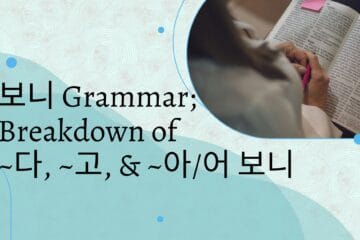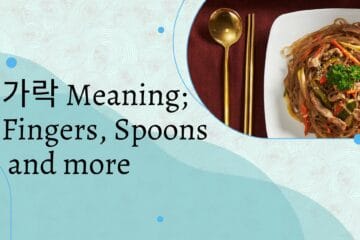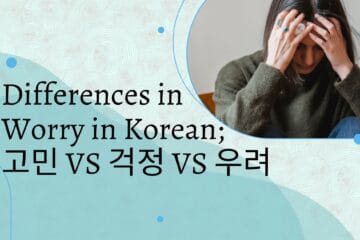When you are just starting out there are a lot of different beginner Korean mistakes that can catch you! Some of these mistakes can limit your learning and slow you down or make it harder and others can make it hard for you to communicate in Korean clearly.

Not Learning Hangul!
First up is a big one, some people might think that using romanization (or Korean written out with roman characters aka the ones we use in English) is easier and nicer to start out with. While it can feel smoother it can really harm you in the long run and you’ll run into a lot of hiccups and mistakes along the way without realizing it. When is a ㄹ more of an L or R? Or ㅂ vs ㅍ, ㄱ vs ㅋ, etc. Learning Hangul is important to of course, be able to read Korean, but also speak! Once you get a hang of Hangul then you can speed up your learning.
Focusing on Vocab Too Much
Learning vocab can be fun and is still important but I believe it’s best to work with a balance. Learn grammar and sentence structure alongside vocab. If you don’t have a good enough grasp on grammar and making sentences then you wont know how to use new words you’ve learned or struggle making it work.
Using 당신 to Mean You
It can be tricky coming from knowing English where we always use the word ‘you’ and trying to learn Korean where it is practically non-existent. A lot of people want to settle into using 당신 or 너 but these aren’t typically used! It’s one of the beginner Korean mistakes that can easily tell who is starting out in Korean if they use this online.
당신 while translated to the formal ‘you’ is not used like that in Korean at all. While it is used in songs, poems, and some written work the meaning is more poetic. In real life it is 99% only used in 2 situations; between a couple, or trying to pick a fight. So be careful not to use it unless you’re married to a Korean!
너 is the less formal ‘you’ but you still have to be careful with it. Even though it is informal using it towards people younger than you but you are not close with can come off as rude. So once again 너 is only really used between close friends, couples, or trying to insult someone.
The best way to address someone in Korean is to just call them by their name or title!
Not Learning about Honorifics
Speaking of how to address someone and not using ‘you’, the way to use an implied ‘you’ is with honorifics! Honorifics are a key part of Korean so it’s important you know 존댓말 (formal speak) and 반말 (informal speak). Most people taking Korean classes will start out using formal speak and then later learn how to speak casually to ease them into the distinctions. For now, check out my breakdown of Korean formalities where I talk about what they are and who to use them with!

Avoiding Batchim
Batchim is key to how Korean is spoken and its pronunciation. Basically, Batchim sets the rules for how the bottom consonants are pronounced (like 받: ㄷ 침: ㅁ) and there are 7 set rules for certain characters. One batchim rule you might know if you’ve learned hangul is that if ㅇ is at the bottom it becomes an ‘ing’ sound like in 사랑. To study batchim I go through all the rules and give examples to help over here.
Not Putting 안 in the Right Place
For most verbs when you want to say “I don’t xx” or “I didn’t xx” you put 안 before the verb like so “밥 안 먹었어요” (I haven’t eaten yet). But verbs that use ~하다 are a combination of a word plus the 하다 (to do) verb. When you are using those words you need to put 안 in between 공부-하다 to make a sentence like “오늘 공부 안 했어요” (I didn’t study today)
example ~하다 verbs:
- 운동하다: to exercise (운동 + 하다)
- 일하다: to work
- 공부하다: to study
- 걱정하다: to worry
- 노래하다: to sing
- 등산하다: to hike
- 사랑하다: to love
- 성공하다: to succeed
- 수영하다: to swim
- 연습하다: to practice
- 인사하다: to greet
- 질문하다: to ask a question
There are a bunch of ~하다 verbs so keep this point in mind!
Misusing 먹다
Another one of the common beginner Korean mistakes is when using 먹다. 먹다 is almost always used in combination with a food and never alone. So when you want to say I’m eating you can’t use “저는 먹고 있어요” you need to add in a food or use 밥 like “밥을 먹어요”.
Here are some quick food words to use!
- 음식: food
- 간식: snack
- 식사: a meal
- 반찬: sidedish
- 밥: rice/meal
- 고기: meat
- 소고기: beef
- 돼지고기: pork
- 빵: bread
- 야차: vegetable
- 과일: fruit
- 김치: kimchi
- 만두: dumplings
- 계란: egg
- 사과: apple
- 배: pear
- 딸기: strawberry
I’ll end it here for now, keep these mistakes in mind and I can make more posts in the future for more mistakes people make; and for intermediate learners as well! Just remember that it’s normal to make mistakes and don’t stress too much about it. Koreans are forgiving of foreigners trying to learn so if you mistakenly say 당신 they probably won’t take it badly.



0 Comments